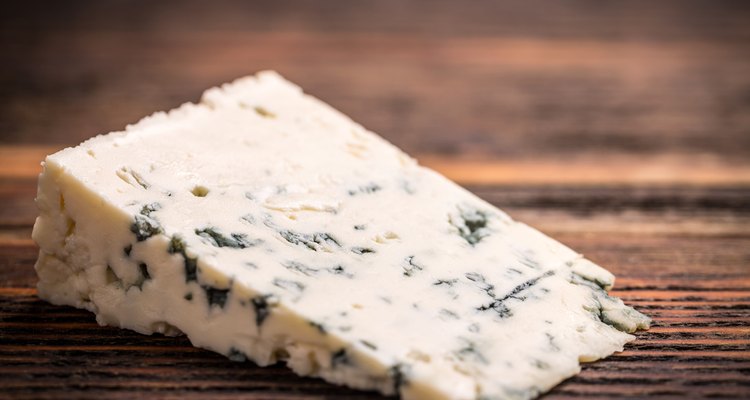
grafvision/iStock/Getty Images
Blue cheeses are typically medium-hard, creamy cheeses injected with mold to create a pungent taste and smell. Varieties include Stilton from England, Gorgonzola from Italy and Roquefort from France, along with a relatively new American brand from Wisconsin called Maytag. The distinctive mold coloring and the smell may mask spoilage that can occur in blue cheeses within two to three weeks of purchase.
Fresh Blue Cheese
A variety of blue cheeses are available at large supermarkets and specialty food stores. Fresh varieties are creamy white with veins of blue or blue-green mold. Most blue cheeses do not have an outer rind, though a few have a powdery, Brie-like surface and others, like Picon from Spain, are wrapped in maple leaves to add flavor and seal in moisture. Check the "best used by" date on packages of blue cheese before you purchase them. This date reflects a general guideline for safe consumption of the cheese, assuming proper storage conditions are met.
Handling Guidelines
According to food safety specialists at Clemson University's Cooperative Extension, blue cheeses should be kept refrigerated and tightly wrapped once purchased, preferably in the original packaging. Most varieties will stay fresh for one to two weeks after purchase as long as they are refrigerated, so don't buy more than you will reasonably use in that time frame. Remove the cheese from the refrigerator for 30 to 60 minutes before serving to allow it to come to room temperature, but do not let it sit out for more than four hours overall.
Signs of Spoilage in Blue Cheese
Beyond package dates, detecting spoilage in blue cheeses is a challenge, since standard signs like strong odor or mold are already present in still-safe blue cheese. Discard blue cheese with a yellow or orange tint, since this often is a sign of spoilage. One exception to this rule is Shropshire, a British blue cheese that is dyed a yellowish shade. Widespread heavy mold on the surface is another sign indicating blue cheese may have spoiled, as is an ammonia-like smell.
Some People Should Avoid Blue Cheese
Cheeses, especially those containing mold, may contain the listeriosis bacteria, which is particularly dangerous to pregnant women, who are generally advised to avoid blue cheese and blue cheese products. Individuals with compromised immune systems -- cancer patients, those with HIV/AIDS and kidney or diabetes patients -- should also avoid blue cheese and other cheeses, unless these are clearly and reliably labeled as pasteurized.
Related Articles

How Can I Tell If Ricotta Cheese Has ...

How to Store a Cheese Wheel With a Wax ...

How to Order Cooper Sharp Cheese

Does a Sliced American Cheese Product ...
Can I Eat My Cheddar Cheese Past the ...

How to Freeze Cheeses

Do You Thaw Frozen Cheese Before ...

How to Tell if Mozzarella Is Bad

Facts About Gouda Cheese

How to Age Cheese at Home

How to Store Cheese

The Difference Between Fresh Cheese & ...

How to Freeze Mascarpone

How to Cook Cheddar Brats

Difference Between White Cheddar & ...

How to Defrost Frozen Mozzarella

Aged Cheeses That Do Not Melt

Pecorino Cheese Nutrition

Does Caviar Go Bad?

What Happens to Cream Cheese if It's ...
References
- The Cook's Thesaurus: Blue Cheeses; Lori Alden
- Clemson Cooperative Extension: Handling of Cheese for Safety and Quality; P. Schmutz and E. Hoyle; June 2008
- Ile De France: Portal of the French Cheese Community: Is My Fromage Still Good?
- Mayo Clinic: Nutrition and Healthy Eating: Moldy Cheese: Is It Unsafe To Eat?; Katherine Zeratsky
Writer Bio
As a national security analyst for the U.S. government, Molly Thompson wrote extensively for classified USG publications. Thompson established and runs a strategic analysis company, is a professional genealogist and participates in numerous community organizations.Thompson holds degrees from Wellesley and Georgetown in psychology, political science and international relations.
Photo Credits
grafvision/iStock/Getty Images